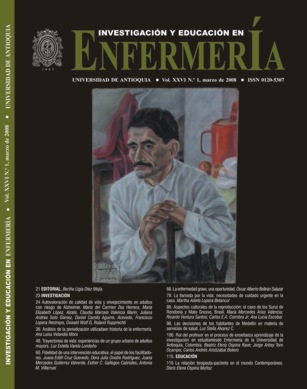CULTURAL ASPECTS OF REPRODUCTION: THE CASE OF THE SURUÍ OF RONDONIA AND MATO GROSSO, BRAZIL
DOI:
https://doi.org/10.17533/udea.iee.2853Abstract
This article communicates results of a demographic study on the cultural aspects related to reproduction in Suruí natives, in Rondônia and Mato Grosso, Brazil. Objective: to raise the cultural aspects linked to fecundity in relation to the demographic conscience of the above mentioned natives. Methodology: with ethnographic approach, we visited the totality of the domiciliary units of the villages known as Linha 14 and Placa, in the Indigenous Land “Sete de Setembro” in 2004. One hundred and fifteen women participated. Results: There are two practices of marital union, polygyny and the interethnic marriage.The ritual imprisonment of the women in their first menstruation and the prohibition of sexual relations during pregnancy, postpartum and a year after birth still continue. Breast milk production is highly valued and children are breastfed up to two years of age. The ideal is having many children and producing a lot of milk. The most important thing for the Suruí is a reproductive strategy that allows the society to continue as an ethnically differentiated entity. Discussion: We analyzed the consistencies and the changes in the sphere of reproduction; we compared them with the results of other studies related to Suruí ethnology and the performance of health services in this community. Conclusion: Cultural aspects are the essential elements for new health policies and to give ethnical specificity to their programs and projects.
Downloads
Downloads
Published
How to Cite
Issue
Section
License
Derechos de propiedad / Direitos de Propriedade
English: If the article is accepted for publication, all copyright will be of exclusive property of Investigación y Educación en Enfermería. The text and the graphics included in the publication are exclusive responsibility of the authors and not necessarily reflect the thought of the Editorial Committee.
Español: Si el artículo es aprobado para publicación, todos los derechos son de propiedad de Investigación y Educación en Enfermería. El texto y las gráficas incluidas en la publicación son de exclusiva responsabilidad de los autores y no necesariamente refleja el pensamiento del Comité Editorial.
Português: Se o artigo for aceito para publicação, todos os direitos autorais serão de propriedade exclusiva de Investigación y Educación en Enfermería. O texto e os gráficos incluídos na publicação são de responsabilidade exclusiva dos autores e não refletem necessariamente o pensamento do Comitê Editorial.















